
Multan’s Sufi Trails: Exploring the Mystical Side of the City
Multan’s Sufi Trails, Welcome to Multan, the city that embraces spirituality and mysticism like no other. Nestled in the heart of Pakistan’s Punjab province, Multan is famous for its rich cultural heritage, historical landmarks, and, most notably, its Sufi trails. In this article, we will embark on a journey to explore the mystical side of Multan, where you can witness the profound influence of Sufism and immerse yourself in a world of spirituality, cultural richness, and architectural marvels.
Multan has earned the title “The City of Saints” due to its association with numerous revered Sufi saints throughout history. Sufism, a mystical branch of Islam, has flourished in Multan for centuries, leaving an indelible mark on its identity and traditions. The city’s spiritual aura and the presence of Sufi shrines make it a captivating destination for seekers of spirituality and those interested in exploring the enchanting realm of mysticism.
Read More: “Multan’s Ancient Fort: Witnessing the Magnificence of Qila Multan”
Sufism and Its Significance in Multan
Multan’s Sufi Trails, Sufism is an integral part of Multan’s cultural fabric, and its roots can be traced back to the early days of Islam. The teachings of Sufi saints emphasize love, peace, and the direct connection between the individual and the divine. It is through their teachings and practices that Sufis aim to attain spiritual enlightenment and draw closer to God.
Sufi Saints in Multan: Multan has been blessed with the presence of several prominent Sufi saints who have left an enduring impact on the city’s spiritual landscape. Among them, Bahauddin Zakariya, Shah Shams Tabrez, Shah Rukn-e-Alam, Shah Gardez, and Shah Yousaf Gardezi hold significant reverence.
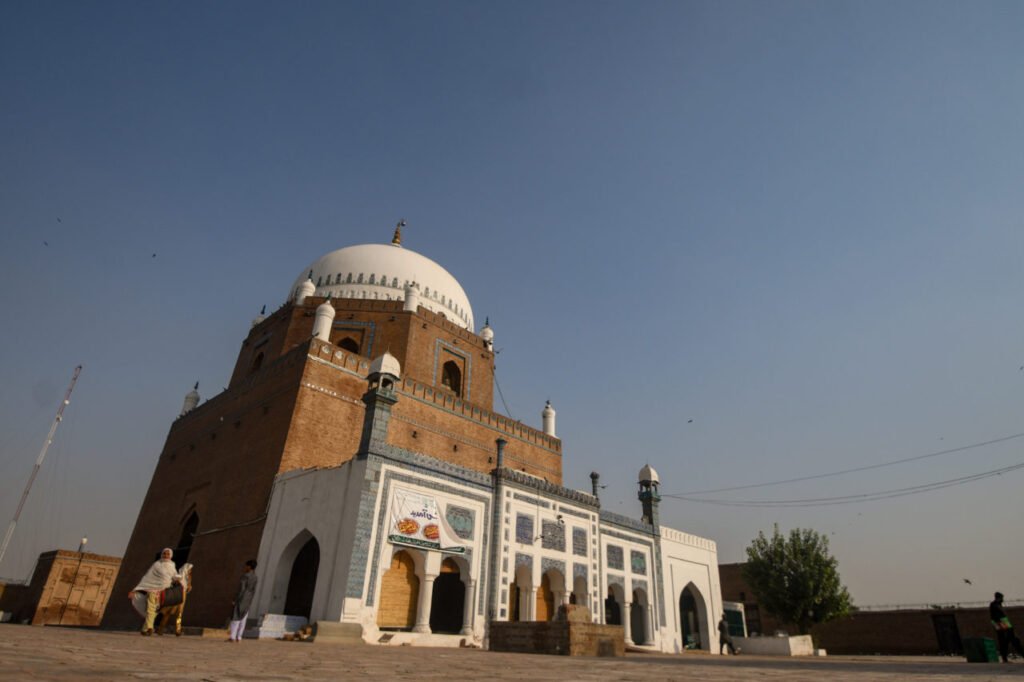
Exploring the Sufi Trails in Multan
Multan’s Sufi Trails, Embarking on the Sufi trails of Multan is a transformative experience that allows you to connect with the spiritual heritage of the city. These trails encompass a series of sacred shrines and mausoleums, each associated with a revered Sufi saint. Let’s delve into some of the most renowned ones:
Shrine of Bahauddin Zakariya: The shrine of Bahauddin Zakariya, located in the heart of Multan, is a testament to the deep-rooted spiritual legacy of the city. Devotees from all walks of life visit this shrine to seek solace, blessings, and spiritual guidance.
Multan’s Sufi Trails, Tomb of Shah Shams Tabrez: Situated near the Fort of Multan, the tomb of Shah Shams Tabrez is a revered site for both locals and tourists. It serves as a symbol of love, and people flock to this shrine to pay their respects to the saint known for his extraordinary devotion and miracles.
Shrine of Shah Rukn-e-Alam: The majestic shrine of Shah Rukn-e-Alam is a masterpiece of architectural brilliance. It houses the tomb of the Sufi saint and draws countless visitors who come to seek blessings and witness the awe-inspiring spiritual atmosphere.
Mausoleum of Shah Gardez: Another significant Sufi shrine in Multan is the mausoleum of Shah Gardez, revered for his deep wisdom and teachings. The mausoleum stands as a testament to the city’s rich spiritual heritage and offers a serene ambiance for contemplation.
Shrine of Shah Yousaf Gardezi: Located near the ancient city walls, the shrine of Shah Yousaf Gardezi is a spiritual sanctuary where devotees gather to seek blessings, participate in religious ceremonies, and experience the mystical energy that radiates from this sacred site.
Mystical Experiences and Spiritual Practices
Multan’s Sufi Trails, Visiting Multan’s Sufi trails goes beyond merely witnessing historical monuments; it offers an opportunity to engage in spiritual practices and experience the essence of Sufism firsthand. Some of the mystical experiences and spiritual practices you can engage in include:
Qawwali Music and Sama: The melodious tunes of qawwali music and sama (spiritual music) have been an integral part of Sufi traditions in Multan. Attending a qawwali session or sama gathering can be a deeply moving experience, where the rhythmic melodies and soulful lyrics transport you to a higher state of consciousness.
Multan’s Sufi Trails, Zikr and Meditation: Multan’s Sufi trails provide a serene setting for practicing zikr (chanting the names of God) and meditation. Engaging in these practices allows you to quiet the mind, find inner peace, and connect with the divine energy that permeates the shrines.
Seek Blessings and Prayers: At each shrine, visitors have the opportunity to seek blessings and offer prayers. The Sufi saints are believed to possess a spiritual connection with the divine, and devotees come with their wishes, hopes, and desires, seeking spiritual intercession and guidance.
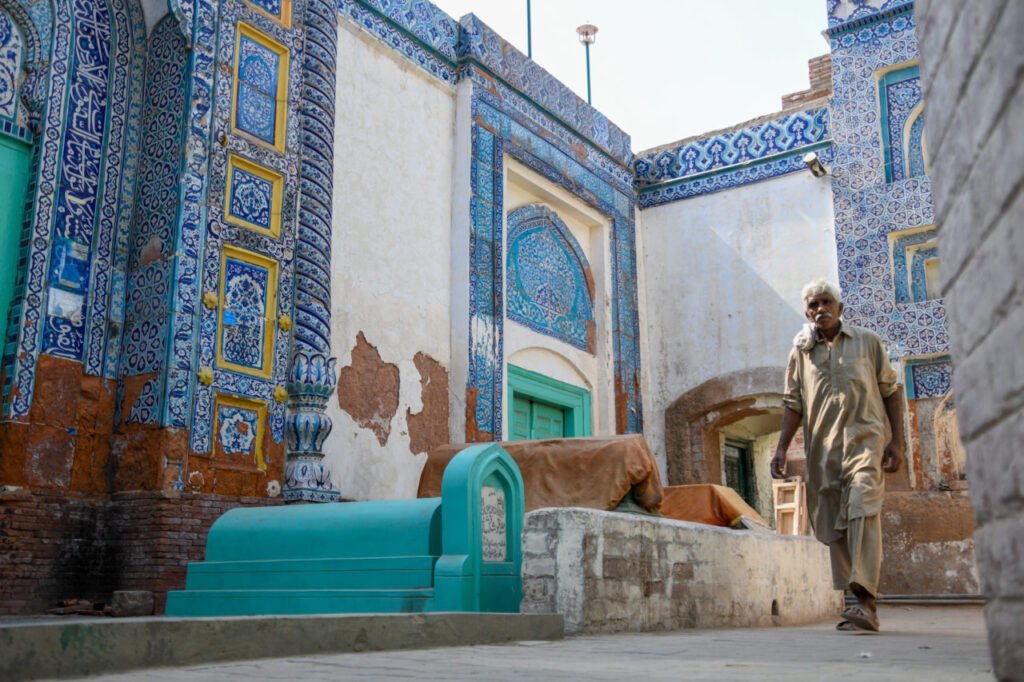
Cultural Heritage and Architecture
Multan’s Sufi Trails, Multan’s rich cultural heritage is not limited to its Sufi trails; the city boasts an array of architectural wonders that reflect its historical significance. Here are some notable landmarks:
Multan Fort: The iconic Multan Fort, dating back to the 9th century, is a grand testament to the city’s rich past. With its intricate designs, stunning gates, and panoramic views, the fort stands as a living testimony to the architectural brilliance of the bygone era.
Ghanta Ghar (Clock Tower): Located in the heart of the city, Ghanta Ghar, or the Clock Tower, is a vibrant landmark that symbolizes Multan’s bustling urban life. Its magnificent architecture and bustling surroundings make it a must-visit spot for tourists.
Multan’s Sufi Trails, Walled City of Multan: The Walled City of Multan encapsulates centuries of history within its ancient fortifications. Roaming through its narrow alleys, you’ll discover hidden gems, traditional bazaars, and glimpses of Multan’s cultural heritage.
The Vibrant Bazaars of Multan
Multan’s bazaars are a true reflection of its lively and vibrant culture. Exploring the bustling markets allows you to immerse yourself in the local atmosphere and indulge in traditional crafts, clothing, and delicacies. Here are a few bazaars worth visiting:
Hussain Agahi Bazaar: Known for its intricate embroidery, traditional handicrafts, and jewelry, Hussain Agahi Bazaar offers a treasure trove of cultural artifacts and souvenirs. It’s an ideal place to witness Multan’s artistic heritage and pick up unique mementos.
Ghanta Ghar Bazaar: Adjacent to the iconic Clock Tower, Ghanta Ghar Bazaar is a bustling market where you can find everything from spices and textiles to electronics and traditional footwear. The vibrant ambiance and diverse range of products make it a shopper’s paradise.
Bohar Gate Bazaar: Situated near the historic Bohar Gate, this bazaar is renowned for its exquisite Multani pottery, clay utensils, and traditional Multani dresses. It’s a haven for those seeking authentic local craftsmanship.
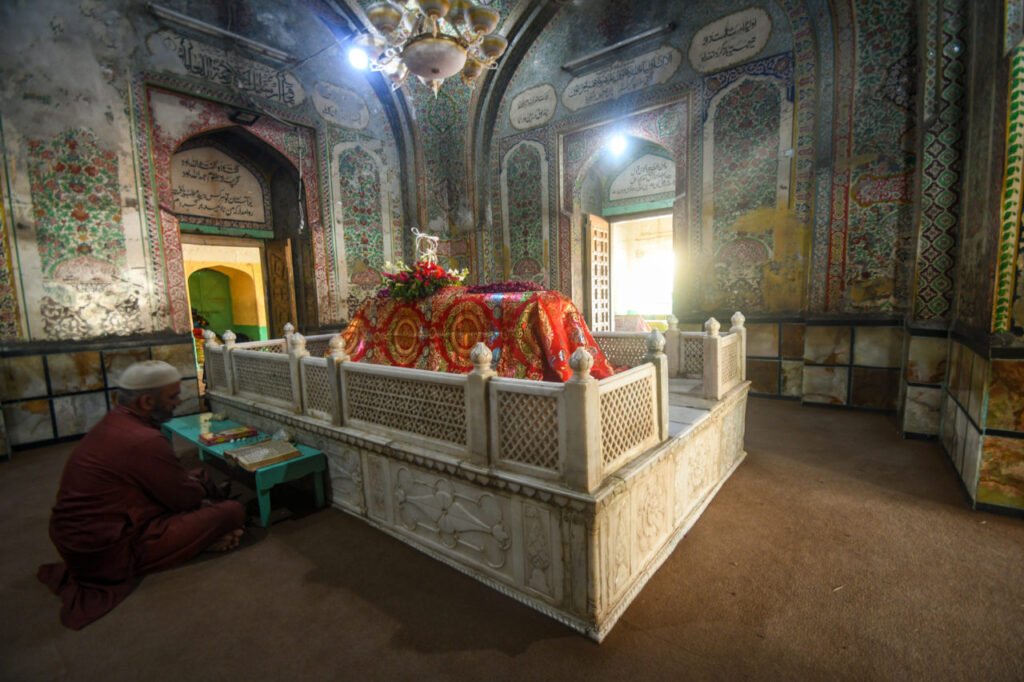
Multani Cuisine and Delicacies
No visit to Multan is complete without indulging in its delectable cuisine. Multani cuisine is a fusion of rich flavors, aromatic spices, and culinary traditions passed down through generations. Here are a few must-try delicacies:
Sohan Halwa: Multan is famous for its mouthwatering Sohan Halwa, a sweet confection made from semolina, sugar, ghee, and saffron. Its unique texture and sweet, fragrant taste have made it a beloved treat for locals and visitors alike.
Sattu and Shahi Tukray: Sattu, a refreshing drink made from roasted chickpeas, is a popular beverage in Multan, especially during the scorching summer months. Pair it with Shahi Tukray, a delightful dessert made from fried bread soaked in sweetened milk and garnished with nuts, for a truly indulgent experience.
Multani Puri: Multani Puri, a crispy, deep-fried bread, is a breakfast staple in the city. Served with traditional curry or chana masala, it’s a flavorful dish that will tantalize your taste buds and leave you craving for more.
Festivals and Celebrations
Multan is a city that celebrates its cultural heritage with grandeur and enthusiasm. Throughout the year, various festivals and celebrations take place, adding vibrancy to the city’s already colorful tapestry. Here are a few notable events:
Urs of Sufi Saints: The Urs festivals, held annually at the shrines of Sufi saints, commemorate their life and teachings. These events are marked by spiritual gatherings, qawwali performances, and a vibrant atmosphere as devotees gather to pay homage to the saints.
Mela Channan Pir: Mela Channan Pir is a famous festival held in Multan, attracting people from all over the country. It is a time of devotion, music, dance, and spiritual fervor as devotees come together to celebrate the mystic saint Channan Pir.
Basant Festival: Multan, known as the city of Basant, hosts a vibrant Basant festival, where the skies are filled with colorful kites and the air resonates with the sound of music and laughter. It is a joyous celebration of the arrival of spring.
Conclusion
Multan’s Sufi trails offer a unique and enchanting journey into the mystical side of the city. From exploring ancient shrines and immersing yourself in spiritual practices to experiencing the rich cultural heritage and indulging in delectable cuisine, Multan has something to offer every seeker of spirituality, history, and vibrant traditions. So, pack your bags, open your heart to the mystic charm of Multan, and embark on a transformative journey that will leave you with unforgettable memories.
Read More: “Multan’s Floral Splendor: 7 Best City’s Gardens and Parks”

FAQs
- What is the best time to visit Multan’s Sufi trails?
- The best time to visit Multan’s Sufi trails is during the cooler months from October to March when the weather is pleasant for exploration.
- Are there any accommodations near the Sufi shrines?
- Yes, there are several accommodations available near the Sufi shrines in Multan, ranging from budget-friendly guesthouses to luxury hotels. It’s advisable to book in advance, especially during peak tourist seasons.
- Can I take photographs inside the shrines?
- Photography policies may vary for each shrine. It’s best to inquire with the caretakers or officials at the shrines regarding photography guidelines and restrictions.
- How can I reach Multan?
- Multan is well-connected by air, rail, and road. The city has its own international airport, and there are regular train and bus services from major cities in Pakistan.
- Is it safe for solo travelers to explore Multan’s Sufi trails?
- Multan is generally considered safe for solo travelers. However, it’s always advisable to take common safety precautions, such as avoiding isolated areas at night and keeping your belongings secure.



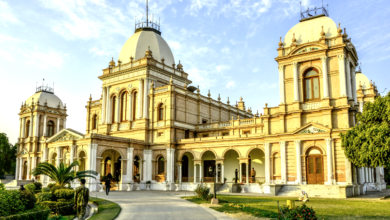
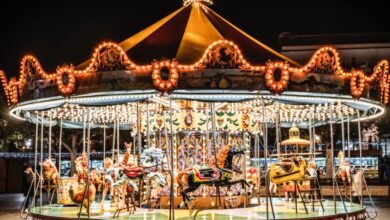
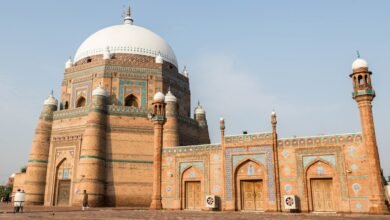

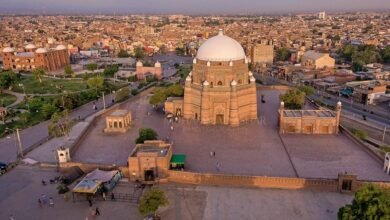
2 Comments